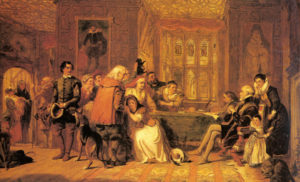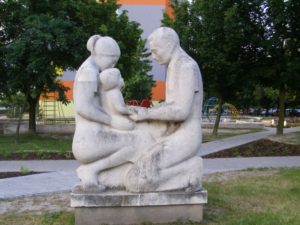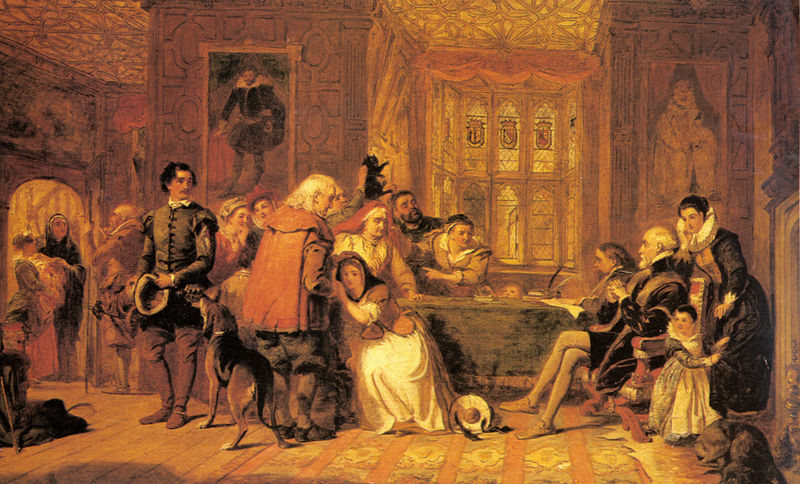Guest Post by Beatrice Mercedes
Your Given Name is a Treasure

The 1953 Arthur Miller play ‘The Crucible’ is an incredible work set around the Salem Witch trials of 1692. Yet this artistic representation is also stunning insight into human nature, with every character playing a significant and recognizable element of social behavior relevant when a group, whether that is a family, community or nation are subjected to an intense dilemma. The play itself was composed to also be an extended metaphor of what was occurring in America in the late 1940’s and 1950’s, commonly called ‘McCarthyism’, which became a virtual ‘witch-hunt’ for Communists in the United States, especially within the Arts.
Yet this is not the reason I am mentioning it, for me, besides this stunning and constructive insight into humanity, I am always moved by the final scene. In the play there is balanced character John Proctor, whose sees his community for what it is, and tries to balance what is expected of him socially and of what he feels morally. He is not an exceptional character, as he has flaws, many of which have caused the situation he is in, but he is human. In the end, he is finally challenged by having to choose to admit to something he hasn’t done, and the community knows he hasn’t, but by admitting it makes him a liar before god, or be honest which would cost him his life.
I will not give away his final choice, and if you ever feel inspired to watch the play, I would sincerely recommend the Daniel Day Lewis version released in 1996.
What I would like to refer to is the concept that makes him define his choice, which is when he balances what damage would happen to his name. He gives a stunning speech on value of his name, which, when I first heard it, made me reflect on the singular value of our name, is it a treasure we carry with us? I like to think it is.
The concept of having at least two names, our given name and our family name, appears to have originated with the classical Roman culture, who throughout their social development adopted various naming customs and practices, but seemed to support this collective structure of names to create personal identification for an individual, which includes the general western system of having a first name, or Christian name, preceding our family name, or surname.
Our given name, is often a gift to us, inspired by our parents or guardians. It is common that there is a reason for a choice, perhaps relating to a treasured memory of our parents, or a name that holds a resonance to them, or maybe, or in addition to, a name that is chosen because they feel it is the first inspiration for us, of how, or what, they want us to be. It’s rather funny that our names always seem to suit us, leaving the question of did we form to our names, or did our names form us? Indeed, some of us didn’t like the choices made for us, some of us have changed that choice, but even so those names are a gift and so often seem intrinsic to our lives.
Following on some of us have middle names, often a homage to relations or a result of diplomacy in the naming process between parents, these generally taken as playful things, almost incidental, but ultimately we all have something we consider our family name, our surname, whether genuine or not, it is this name either is, or becomes the primary legacy of our family. Now for the multitude of us this is an ancient treasure, leading back to our ancestors, a hereditary gift handed down from generation to generation.

I sincerely empathize with those who, for some reason or another, have lost or be denied this gift. I can appreciate that sense of lost, and possibly the need of strength to emotionally deal with the sense of having no traceable past. For the vast remainder of us, it is our continual and constant reminder of our family. I wonder how many of us use it as a tool to remind us of our deeds, that when we fail in life, we fail the legacy passed to us. Is that the meaning of John Proctor’s speech, that our name and the value of that gift handed to us is something that we feel we should protect. Is this the basis of classical honor?
Many theories exist over the meaning and value of names, and how they can affect us. These include the numerical value of the letters and the linguistic source of a name. A delightful agreement exists that the reason that a woman’s character supposedly changes after marriage is because her name has changed, although I wonder if the males part in either noting that supposed change or relinquishing any other responsibility in any change was also factored in? (Just saying).
Although, in this modern age, with a vast increase in single parent families and out-of-wedlock births, I wonder if the value we attribute to our names may diminish, will they become little more than numbers in their substance. Indeed, the biological link to our family, and how that traces back through time is a stronger and undeniable bond, and far more substantial than a collection of letters and any allocated literary meaning, but our names remain to be a gift, a token, a symbol added to our genetic code that gives us something common for us to value – a treasure.
~Guest Post by Beatrice Mercedes



Thanks for this thoughtful article Beatrice. I appreciate your contributions here on MW. You offer so much to think about and consider. It is amazing how Words, like Names, do hold such power. The words you say to yourself, and the respect (or disrespect) you show to words/names can influence futures.
Thank you Jenny. I am rather enjoying this outlet for my thoughts. I hope they aren’t boring even though they are just my thoughts. I will try and throw in some genuine Treasure ones. Thank you again for the opportunity and suppport.
Thoughtful article, thank you.
Are our names destined to us or are we destined to become as our name/s.
Such a fine lineage between fate and destiny.
Dear JL,
Thank you also. Oh and I like that line “Are our names destined to us or are we destined to become our name/s”. A beautiful and curious thought.
Kind Regards.
I agree, it’s my fav line too! Ty for the excellent article. I will be sure to check out the movie asap.